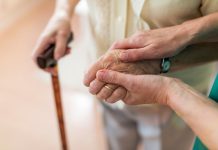
In this month’s Science Mitten column, we look at two studies from Michigan-based researchers related to COVID-19 and another on concussion recovery time.
Link between COVID and diabetes found
A Michigan Medicine researcher says his team has identified an enzyme that makes people with Type 2 diabetes significantly more susceptible to severe illness if they are infected with COVID-19. What’s more, identification of the enzyme is providing new avenues for more effective treatments that involve administering interferon beta, which helps the body make certain enzymes that COVID suppresses, according to Dr. W. James Melvin. “Our research is showing that maybe if we are able to target patients with diabetes with interferon, especially early in their infection, that may actually make a big difference,” he says. The study appeared in the Proceedings of the National Academy of Sciences.
Cheaper, faster COVID diagnoses
Michigan State University graduate student Zach Morehouse was part of a team that developed a test for SARS-CoV-2 that takes half the time, costs less, and requires fewer materials. The process, published in the journal PLOS One, could be a boon for providing inexpensive and highly accurate COVID tests in far-flung, less affluent corners of the globe, such as Malawi where it was field tested. “Having the ability to bring this technology into resource-challenged areas that maybe can’t afford to set up a fully-automated testing lab really helps,” says Morehouse, a fourth-year student in the College of Osteopathic Medicine.
Recommended concussion recovery time doubles
Most people should take four weeks to heal from a head injury, not the two weeks previously thought to be adequate, according to the largest-ever study of concussions in college athletes. University of Michigan Concussion Center Director Steve Broglio, one researcher on the multi-school project, says the data, published in the journal Sports Medicine, shows that coaches, parents, and athletes should reconsider a hasty return to the field that could lead to reinjury. Years ago, he says, “We’d ask, ‘Do you have symptoms?’ and if the answer was no, the athlete was put back on the field. Gone are the days when concussed athletes are put back in the same day. Now, we can think of it as a dial, where we slowly progress people back into the sport. Once a player is asymptomatic, it can still take some time.” The study examined records of 34,709 student-athletes from 30 colleges and universities, of whom 1,700 suffered concussions playing sports. Football players accounted for more than half — 54.7 percent — of male concussions.
This story is featured in the November 2021 issue of Hour Detroit magazine. Read more stories in our digital edition.
|
|
|









